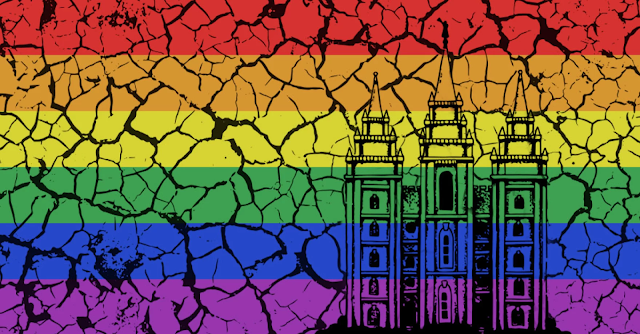As a young co-ed at Brigham Young University, I wasn’t
trying to become a subversive voice for cultural change and gender equality. I
wasn’t advocating for women’s ordination. I wasn’t personally invested in the
budding movement to wear pants to church on Sundays. All I wanted was to watch
the general Relief Society meeting, and to know if anyone else was coming with
me. On that autumn day in 2010, all I cared about getting a seat to watch the
meeting in the Marriot Center—on time.
Regency Apartments was an all-girls complex that fit six
women to each unit. Someone was always coming or going from my friends’
apartment—usually me, or one of half a dozen other people with some connection
to someone there. Clarissa didn’t feel like going to the Marriot Center with
me, but did I mind turning the television on so she could watch it from home?
That’s what I was doing when someone else’s boyfriend and another guy I didn’t
know came in through the door. Katie wasn’t ready yet, but could they just sit
on the couch and wait for a bit? She’d be right out.
Out of the boredom that overtakes all men sitting on
couches, they asked what I was doing.
“Looking for the general Relief Society meeting.”
One of them laughed and scoffed.
“You mean the meeting with all the doilies and women CRYING?”
They laughed heartily at their own joke.
I didn’t look up from what I was doing before I gave a
caustic response.
“Relief Society is not a meeting where we all go to cry like
children. We are grown women and this is the female leadership of our church. If
you wouldn’t talk about the priesthood leadership like that, don’t talk about
our leadership that way.”
I don’t remember what response they managed to sputter out,
and frankly I didn’t care. I had somewhere to be and nothing nice to say to
them at that point.
But I’ve thought about that experience a lot. I’ve asked
myself a lot of questions about it—the same kinds of questions I found myself
asking many times at BYU. How can someone be raised in the Church their entire
lives and have no respect for the Relief Society? How can someone who was raised
by a Relief Society sister be this painfully ignorant about the contributions and
sacrifices we make? It was another experience where I, the convert in the room,
had to explain something fundamentally basic about the Church to someone who
was raised in it, who had taken that experience for granted. It was profoundly isolating
in a way I hadn’t been prepared for.
But this was different. It landed differently. It hurt more.
I got my first glimpse of what too many men in my own church genuinely think of
me, whether they will openly admit to it or not.
As the years passed and I continued gathering experiences as
a woman in the Church—first as a missionary, then as a wife, a childless woman,
and eventually a temple ordinance worker—I noticed a pattern emerging. This
stereotype of women who cry and make things pretty without contributing
anything of substance was not an isolated attitude. I encountered it in
multiple countries, from men young and old, in converts and those who were born
in the covenant. The failure to instill respect for Relief Society in our boys
and young men is all but universal, and begins at an early age.
Allow me to demonstrate.
How many times do boys and young men hear their male
leadership pray for women by name from a pulpit, or at an altar? The general,
stake, or local Relief Society president—how often do we pray for them publicly?
I’ve been in the Church for fifteen years now. I’ve never heard it once.
How many various male leaders do they see receiving prayers
by name from a pulpit? The bishop, the stake president, the visiting general
authority, the apostle who is sick, the president of the Church—the list goes
on forever. Some will be familiar with the temple policy that forbids any prayer
to be said for any individual by name who is not the president of the Church.
This excludes all female leadership. How is that discrepancy reinforced in how
these young men are taught to pray at home?
When boys and young men receive temple recommends at twelve,
they affirm they have a testimony of the president of the Church as the only
living person with the power to access the keys of the priesthood. They sustain
that prophet by name. That experience is then reinforced in general conference
when they give a similar affirmation, by name, for every single member of the
First Presidency and Quorum of the Twelve as “prophets, seers, and revelators.”
They do not similarly sustain any woman by name in a temple
recommend interview. They sustain women by name in general conference and in
their local units only when the leadership changes. Depending on their age and
where they live, they may be able to count how many times they’ve witnessed
this in their lifetimes. And even though women prophesy,
have visions,
and receive revelation
in this church, these boys and young men have never heard ANY modern woman
referred to as a prophetess, seer, or revelator. When God declared, “It is not
good that the man should be alone,” surely, he meant in every aspect of his
life—including leadership and church administration.
As participants in the offices of the Aaronic (and later,
the Melchizedek) priesthood, they will act as ministering brothers to women in
their wards with their leaders and relatives. They will have occasions to see
men blessing women through the power of the priesthood. They will never see
that action reciprocated. How DO women bless men, other than by making food or
giving them children? Of course, that’s all some of them think women are good
for—that’s all they’ve ever seen us do! And in their young minds, they cannot
fathom how the priesthood blessings they watch their fathers give to sisters in
the ward are equal in power and influence to the casseroles those same sisters
bring over for a variety of reasons throughout their lives. The confusion is
understandable because the assertion is laughable. How is an ordinance supposed
to compare in importance to a tray of funeral potatoes? Especially if the
sister doesn’t “do it right” like their family does, and everyone eating it
complains about how weird it tastes and how much better it would be “if mother
had made it"?
We can quote scripture at these kids all we want. We can
tell them “neither is the man without the woman, neither is the woman without
the man in the Lord.”
We can quote 1 Corinthians 12 at them about how every member of the body is as
important as every other part. We can quote Joel about how our daughters will
prophesy and upon the “handmaids” in the last days God will pour out his
spirit.
When are we going to realize our youth are not internalizing
what we tell them? They’re internalizing what they hear and see us do. And what
they hear and see is an unacceptable discrepancy between how men and women are sustained
at church. The unspoken message, taught in action, is that women don’t receive
these opportunities because they don’t deserve them. Their work is not
important enough to merit any real acknowledgment or praise by name. After all,
women exist to make babies and feed people. That is their purpose because
nothing else they do will ever be more important than that. What could they
possibly want or need with more?
This sounds harsh—until you’ve been a young woman in this church and you’ve heard these words come out of a young man’s mouth. Then the
mouth of someone the same age as your father. Then a grandfather. Then you hear
versions of this from your bishop. A stake president. A mission president. The
elders in your mission. Your ministering brothers. The day you hear some
version of it come out of your husband’s mouth is a particularly hard day.
But the day that would truly break me would be the day I
hear any of this come out of the mouth of my son. That is why the secret prayer
of my heart, long before I ever fully realized it was there, was that I would
never have to raise a boy in the Church.
Why should every man in the Church be required to go to
Relief Society? So they can learn what the voice of the Divine Feminine sounds
like, and truly “live by every word that proceedeth forth from the mouth of
God.”
I want them to realize that for as long as they believe there is no woman in
the Church equal in power and authority to the prophet, they are unprepared to
enter the presence of the Lord and to meet his Equal. I want them to realize we
are also servants. We
have names. We are also the anointed.
I want them to understand that in a church of continuing revelation, there is
no “sealed portion”—just the words written in the fleshy tables of a woman’s
heart they will never receive without us, no matter how much they ask, seek,
and knock.
I want them to see the sheer number of clipboards and sign-up
sheets it takes to do all the compassionate service, community outreach, and
the amount of cooking it takes to run a congregation the way they expect
it to operate.
I want them to see how differently women speak in spaces
that don’t revolve around men—how honest we are with each other. How vulnerable
we are, in ways many of them are still not allowed to be. If there’s any truth
to Relief Society being a place where women cry, men shouldn’t be laughing
about it. We’re usually crying because of something they’ve said or done. In
those moments, we’re exercising the gift of healing (and the gift to be
healed) from the wounds men have been causing us since before this world began.
It’s an endowment of power unique to us. It also comes complete with a whisper
network where we discuss together which men at church to avoid for our own
protection. You know, the ones President Monson warned us (and you) about when
he said, "Men, take care not to make women weep, for God counts their
tears."
I want the men in my church to listen to women. Really
listen. Hear the voice of God in what we have to say. Recognize it. Hear that
it is prophetic. It is revelation, for “whatsoever they shall speak when moved
upon by the Holy Ghost shall be scripture, shall be the will of the Lord, shall
be the mind of the Lord, shall be the word of the Lord, shall be the voice of
the Lord, and the power of God unto salvation.” I want men to understand
they’re not the only prophets, seers, and revelators in this church. Clearly,
that’s not something they’re learning in Priesthood these days.
So come on over to Relief Society, fellas! Pull up a chair.
Get a cookie that some woman got up early to make this morning before she came to
church. Let’s taste the quiet desperation in every bite as you finally realize
it’s there for the first time.
We can all cry about it together.





.jpg)
















